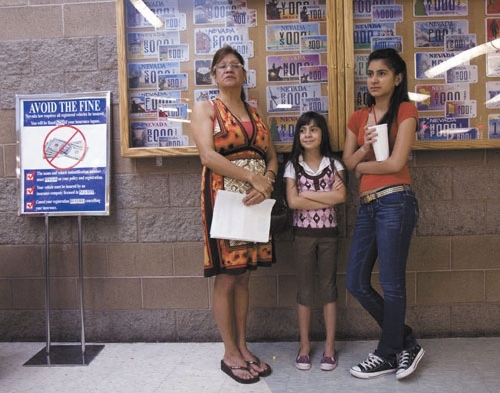Troubled teens might lose wheels under schools plan
Clark County School District officials are seeking to use driver's licenses and work permits as leverage against potential dropouts and truants.
Under legislation proposed by the district, those kinds of problem students could lose their licenses or work permits, which teens between 14 and 18 must have, according to Clark County Juvenile Justice Services. Their parents might have to attend classes on how to become better parents. Moms and dads also could forfeit their hunting and fishing licenses if their children are not showing up at school.
The Clark County School Board on Wednesday approved forwarding those ideas to state legislators who next meet for a regular session in 2011. The board stipulated that its approval of the proposed bill draft was in concept only since many of the details still need to be worked out.
Some board members shuddered over the punitive measures of the "Graduation Priority Act," but liked the idea of starting a conversation in the community.
"There have to be accountability measures," School Board member Carolyn Edwards said. "I believe, generationally, parenting skills have decreased over time. We have gotten easier and easier on our children. ... There used to be a time when the parent believed the teacher over the student. Today, it's a very different story."
At Wednesday's board meeting, Robert Cordner, a parent and grandparent, argued that responsibility must rest with the parents, not the government.
Under the proposed bill, the "school determines who drives and who does not. Do we really want to be in that position in the community?" Cordner asked.
Requiring teen workers to show proof of school attendance would also send a message that "employers now work for the school," he said.
"What I am trying to say is that the emphasis is on the wrong syllable," Cordner said. Instead of imposing new punishments, the district should research why kids are dropping out.
Shelby Schroeder, 15, also thought the proposed bill was an overly simplistic solution to a complex problem.
"I don't think it's fair," said Schroeder, a sophomore at Palo Verde High School. "People can get pregnant or something. There are other reasons why kids drop out."
Shelby was waiting to get an instructional driving permit with her dad, Mike Schroeder, at the Department of Motor Vehicles office on West Flamingo Road near Buffalo Drive.
Mike Schroeder said a no-driving rule targeting dropouts would be fine as long as it's aimed at those under 18 years of age.
Briana Mendoza, 16, a senior at Cimarron-Memorial High School, thought the rule would be a good incentive for teens to stay in school.
"If they don't have a driver's license, they can't go to the store and get cigarettes," added her mother, Lupe Mendoza.
The proposed legislation would supplement existing laws on the books for punishing parents of truants and determining work hours for youth, district officials said. The proposal doesn't break new ground, officials said. Other states, including West Virginia and Minnesota, already have adopted laws that deny dropouts driver's licenses.
Under the district's proposal, driver's licenses would be subject to annual renewal for those under 18. Teens would need to show proof of high school enrollment, attendance information and evidence of passing grades. Truancy citations would become bench warrants prohibiting the issuance of a driver's license without the intervention of a judge.
Under the employment provision of the proposed legislation, those younger than 18 would have to show proof of school attendance and passing grades, which employers would have to keep on file. The information would be subject to examination by state inspectors. Exceptions might be made for those with hardship circumstances.
Not all the recommendations are punitive -- some proposed changes would help correct deficiencies in truancy law, officials said. Students with 10 or more absences could make up time by enrolling in extra classes or passing a high-stakes test to show proficiency. Currently, these students are subject to denial of credit and/or promotion to the next grade.
The sense of futility is often what causes many students to drop out, said Joyce Haldeman, the district's associate superintendent for government and community relations.
The legislation also proposes new kinds of diplomas for high-achieving students who want to graduate early or who are focused on a particular trade.
Help might also be on the way for students who are doing well in school but are having trouble passing state proficiency exams, which are a requirement of graduation. Seniors who have taken the test multiple times might have their passing grade based on a combined or cumulative score from all their previous tests.
To be eligible for a passing grade by a cumulative score, the senior would have to meet certain qualifications such as having sufficient credit, a grade point average of 2.75 or better and compliance with attendance requirements.
Contact reporter James Haug at jhaug@reviewjournal.com or 702-374-7917.

















